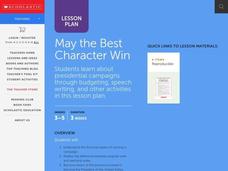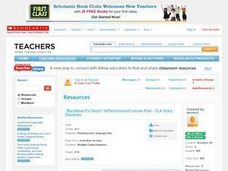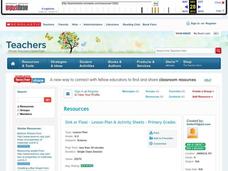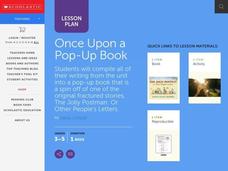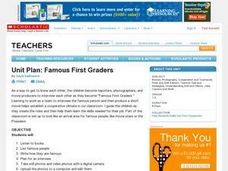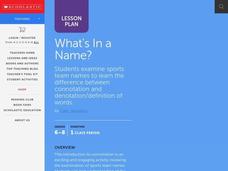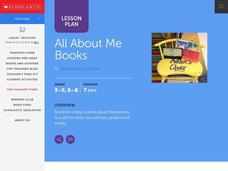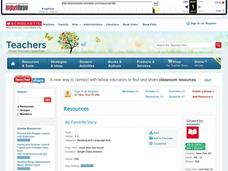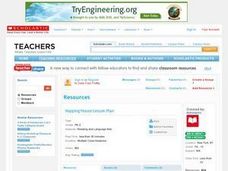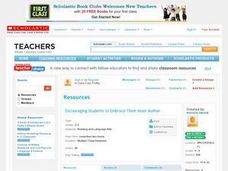Curated OER
May the Best Character Win
Running an election campaign takes money. Class groups must effectively budget money in order to design and purchase sufficient advertising aimed at procuring classmates' votes. After completing an online tutorial, they also write and...
Curated OER
Balls & Hoops : Fun with Balls and Tubes
Students race to keep these balls rolling. In this early childhood physical education lesson, students experiment with cause and effect as they work with different heights of cardboard tubes.
Curated OER
"Blackbeard's Ghost" Differentiated Lesson Plan
Develop a better understanding of "Blackbeard's Ghost" with this differentiated lesson. Working in groups on a creative project, middle schoolers can reinforce their reading comprehension and literary analysis skills. Use this...
Curated OER
Sink or Float
Using a variety of objects, learners conduct buoyancy experiments. They make predictions on which object will sink or float and test their predictions. They use a graphic organizer to record their findings.
Scholastic
Writing Letters to the Chancellors of the Academy of American Poets
To celebrate National Poetry Month, young writers focus on the role letter writing has played in the development of poets. They begin by journaling three to five associations to a writing prompt that requires them to identify their...
Curated OER
Slimy Advertising and a Wicked Resume
Students compare and contrast a classic fairy tale with a fractured one. They write an advertisement that would entice a witch and a resume for a frog prince who is hiring. They publish their completed work.
Curated OER
I Hate to Complain but your Cheese Stinks
Young scholars read and discuss the "fractured" fairy tale "The Stinky Cheese Man". They imagine that they are in the fairy tale and write a letter of complaint concerning the Cheese Man and how he stinks up the town.
Curated OER
Once Upon a Pop-Up Book
Students design and illustrate a pop-up book of their original writing after studying the book, The Jolly Postman: Or Other People's Letter's. They present their book and complete a self-assessment rubric.
Curated OER
Let's Learn About Plants!
Take your class on a nature walk around the school and have children assume the role of "Plant Hunter" as they go. The goal is to explore the different parts of a plant. They return to the classroom to discuss the parts that they saw and...
Curated OER
Let's Grow Plants!
Students read and dramatize the stories "The Tiny Seed" and "The Carrot Seed" as an introduction to seeds and what they become. They work in small groups to plant their own seeds and over the span of a week (+ or -)students keep track of...
Curated OER
Best Part of Me
After listening to the story, The Best Part of Me, learners will identify a positive physical feature of themselves, and create a descriptive poem about their favorite feature. Photographs are taken, and a nice final draft of the poem is...
Scholastic
Defining Conflict Using "The Interlopers"
Feeling conflicted? Work out those issues with a language arts instructional activity on internal and external conflict. Using "The Interlopers" by Saki, class members identify the conflicts between the characters before writing...
Curated OER
Famous First Graders Unit
Class members become reporters, photographers, and movie producers to interview each other as they become "Famous First Graders." Learners work as a team to interview the famous person and then produce a short movie. They create...
Curated OER
Socratic Seminars in English Class
What is a Socratic Seminar? Discover this type of discussion and it functions. Split the class into two groups with Group A sitting in an inner circle and Group B in an outer circle. Each person in Group B is assigned to a person in...
Curated OER
Using a Graphic Organizer to Research a Question
Is Pluto still a planet? Using this popular question, kids are introduced to graphic organizers as a writing tool. As a class, they watch a demonstration on how to use them and work together with a partner to research whether Pluto is a...
Curated OER
What's In a Name?
Introduce your language arts class to connotation, denotation, and diction. Middle schoolers identify and differentiate between the connotative and denotative meanings of words by analyzing the fictitious sports team names....
Curated OER
All About Me Books
Young authors write books about themselves using one of the identified types of literature and the writing process. They identify the common characteristics among the books in each group, edit, and gift their books to a younger student.
Curated OER
Boxes & Blocks: Puffer Bellies and Box Cars
Students turn cardboard boxes into outdoor dramatic play. In this early childhood visual arts lesson, students explore cooperative and dramatic play outdoors by challenging children to create a train from cardboard boxes.
Curated OER
My Favorite Story
Students discuss their favorite book. In this book discussion lesson, students name the title and tell what makes the book special. Students also review the setting, plot, conflict, and resolution. Students make a book that tells all of...
Curated OER
Napping House
Read The Napping House and describe the visual characteristics of the illustrations. In this perspective lesson, learners identify color elements. They recognize that the text is repetitive and find patterns in the...
Curated OER
Encouraging Students to Embrace Their Inner Author
Everyone is a writer! Youngsters compose an original piece of writing. In this writing lesson, they come up with their own idea for a piece of writing, revise it, and then publish it with illustrations. This lesson includes three...
Scholastic
Reading Poems From the Academy of American Poets Chancellors
Start a lesson on poetic voice with a peer to peer discussion on what characterizes the strength in the voice with which a writer chooses to express himself/herself. In pairs, readers are tasked with reading and creating T-charts for...
Scholastic
Ready to Research Owls
Researching facts about owls can be a hoot for your class. Let them wisely collaborate on this writing project. The resource is the second part of three parts. It is best to use all three lessons in order.
Scholastic
Discussion and Dissection of an Owl Pellet
Young scientists get the chance to dissect pellets "owl" by themselves to determine the owls environment and nourishment. This is the third part of a three-part series.
